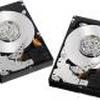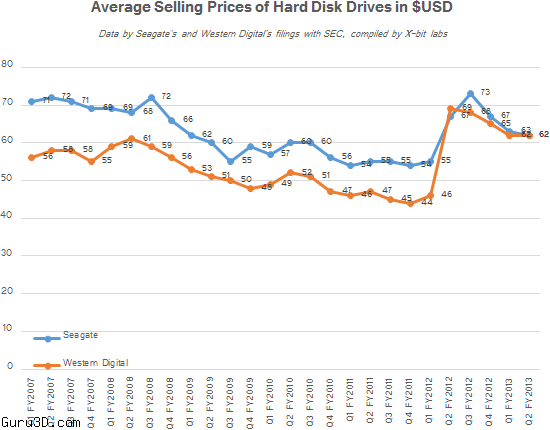Over at Xbitlabs they compiled this great little plotted chart showing how incredibly slow average selling prices of HDDS are dropping back to the “pre-flood” levels, but today’s ASP are on the pre-economic crisis levels. average selling pBased on the recent financial results of Seagate Technologies and Western Digital Corp., average selling price of a hard disk drive in Q3 – Q4 of calendar 2012 (Q1 – Q2 of fiscal 2013) decreased to $62 - $63 per unit, which is considerably higher than $45 - $55 ahead of the flood in Thailand in 2010.
Prices are gradually returning to their historical levels due to general dynamics of the personal computers market. It remains to be seen whether the ASPs will get back to the “pre-flood” levels, but today’s ASP are on the pre-economic crisis levels.
But is in line with ASPs between $53 and $62 in Q3 2008 (Q2 FY2009), ahead of a major drop of demand for PCs in the following quarters due to global economic. Obviously, just average selling prices of hard disk drives cannot fully describe the market situation by themselves since they are affected by multiple factors, such a product mix, seasonality, product performance and so on. Nonetheless, it is evident that the HDD ASPs peaked in Q4 2011 (Q2 FY2012) and were on the decline trend since then.
At present WD is trying to sustain average selling prices on certain levels and avoid further drops since it will negatively affect its margins and competitive abilities in the long-term. The company’s new chief executive said that it limits production levels in order not to produce excessive inventory and then sell it at low prices. At the same time, Western Digital is looking forward to make its business and products more economically efficient, which should help the company to survive even with soft market demand and low ASPs. “We obviously have more capacity than what we are producing because we are throttling it to what we see as demand. But we are taking actions to reset our capacity potential to a more appropriate level given what we view the secular changes in terms of the overall demand profile for the industry. Not that we do not expect to see growth, but not at the same rates than what we have historically done. […] There are multiple opportunities that we have as an organization to continue to improve our cost structure,” said Stephen Milligan, chief executive officer of WD.
Average Selling Prices of Hard Disk Drives after Floods


